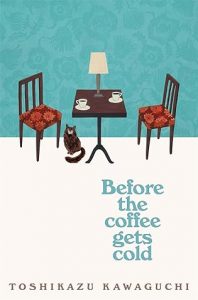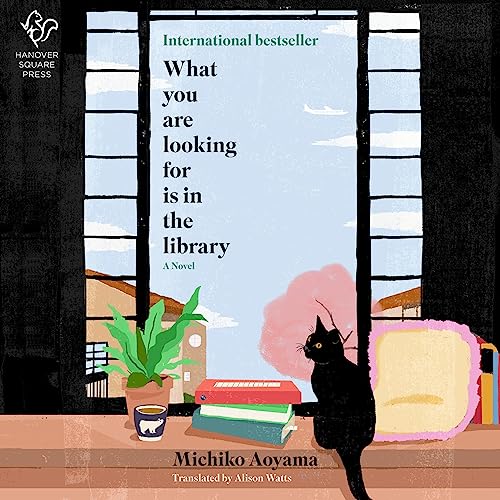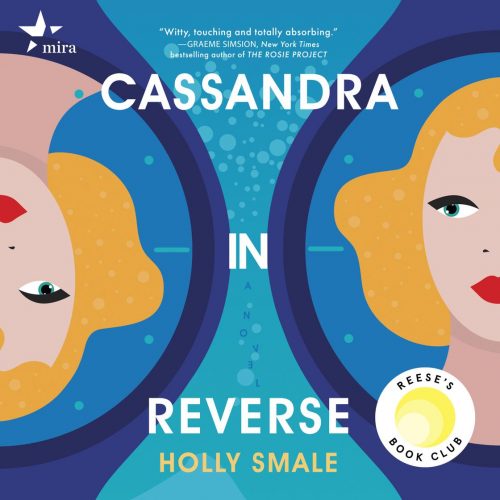 I Made It Out of Clay by Beth Kander
I Made It Out of Clay by Beth Kander Narrator: Gail Shalan
Format: audiobook, eARC
Source: supplied by publisher via NetGalley
Formats available: hardcover, ebook, audiobook
Genres: contemporary romance, Hanukkah romance, holiday romance, magical realism
Pages: 352
Length: 9 hours and 47 minutes
Published by Harlequin Audio, Mira on December 10, 2024
Purchasing Info: Author's Website, Publisher's Website, Amazon, Barnes & Noble, Kobo, Bookshop.org, Better World Books
Goodreads
In this darkly funny and surprisingly sweet novel, a woman creates a golem in a desperate attempt to pretend her life is a romantic comedy rather than a disaster.
Nothing’s going well for Eve: She’s single, turning forty, stressed at work and anxious about a recent series of increasingly creepy incidents. Most devastatingly, her beloved father died last year, and her family still won’t acknowledge their sorrow.
With her younger sister’s wedding rapidly approaching, Eve is on the verge of panic. She can’t bear to attend the event alone. That’s when she recalls a strange story her Yiddish grandmother once told her, about a protector forged of desperation… and Eve, to her own shock, manages to create a golem.
At first everything seems great. The golem is indeed protective—and also attractive. But when they head out to a rural summer camp for the family wedding, Eve’s lighthearted rom-com fantasy swiftly mudslides into something much darker.
My Review:
This is going to be one of those reviews where I write AROUND the book more than I write ABOUT the book, because my reaction was considerably more about the issues it raised than it was about the content – and that’s saying something because I have more than a few of those as well. Just that some of those issues are ‘me’ things that may or may not be ‘you’ things.
As always, your reading mileage may absolutely vary, so in this particular case I’m pleased that I have an excerpt from the book to include so that you can judge for yourself whether this will turn out to be a book for you.
I have an additional reason for including the excerpt. I want you to have a chance to see what the book actually IS, rather than what the blurb says it is. Because that’s very much a case of never the twain shall meet.
As the story opens, Eve’s life is far, far, far from being a rom-com. Also, the story is neither darkly funny nor sweet, surprisingly or otherwise. And she doesn’t create the golem until nearly the halfway point of things.
But the story is dark, because Eve’s is in the middle of a long, dark night of the soul. Her beloved father died suddenly just barely a year ago as this Hanukkah story opens, and she’s still utterly devastated. She’s never gotten over the death of grandmother a few years previously, so she’s grieving double while her mother and sister both seem to be breezing along. She has few friends, she’s terribly lonely, and she’s eating her feelings constantly. As if that weren’t enough, her employer is hinting strongly at layoffs AFTER the holidays if not before.
In other words, Eve is in a pit and hasn’t stopped digging. It’s hard to read about just how terrible she’s feeling and how much depression she’s dragging around.
Which is where the audiobook, read marvelously by Gail Shalan, made things worse for me personally because she did such a terrific job as the narrator. When a story is written in the first person perspective, and it’s narrated by someone who is a great match for the character, I get a bit too deeply caught up in the character’s emotions.
And that’s what happened in I Made It Out of Clay. Not just because Eve and I are both Jewish, but because her Chicago neighborhood is where I used to live, her parents’ synagogue is in the town where I used to work and I lost my own father exactly the same way she did. It all got a bit too close – at least before she magicked up that golem – and I got so into her problems they were depressing me.
So my feelings about the story went to places that the author couldn’t possibly have known or intended, but absolutely did affect my reading and listening of it.
The story does get, well, livelier, for lack of a better term, and does head into the sort of horror-adjacent dark I was expecting from that blurb, once the golem arrives on the scene. Eve’s frantic efforts to disguise her wedding date as a real person and not a magical construct gave the story a lot more oomph than it had up to that point.
But I was too mired in her depression to see whatever funny or sweet parts there might be until the very, very end.
Escape Rating C: If you’re looking for this to be a Hanukkah-themed romantic comedy based on that blurb, you’re going to be in for a bit of disappointment. Instead, II would recommend you take a look at Love You a Latke by Amanda Elliot, Eight Nights to Win Her Heart by Miri White to fill that particular holiday craving and Magical Meet Cute by Jean Meltzer if you think your Hanukkah romance reading won’t be complete without at least one golem among your eight nights of presents.
Excerpt from I Made It Out of Clay by Beth Kander
The soft growl on the train is coming from me.
I flush with shame at the insistent rumbling of my stomach. Thankfully, the Monday-morning brown line is too crowded with bundled-up commuters for anyone but me to notice the sound. If someone does somehow clock it, they’ll probably assume it’s coming from the pigtailed pregnant woman I gave my seat to at the last stop.
The train lurches, and I nearly drop my peppermint mocha. Technically, you’re not supposed to have open food or beverages aboard, but no one follows that rule. You’ll only get in trouble if you spill on someone. Nobody really cares what’s going on in the background until the mess impacts them.
When my stomach rumbles yet again, the pigtailed pregnant woman gives me a conspiratorial look. Everyone else on the train might think it’s her, but she knows it’s me. She isn’t judging, though; her expression is friendly. Surprisingly kind and intimate in a maternal sort of way. I take in her pert nose, amused hazel eyes, and the beautiful coppery shade of her two neat, thick braids. I want to tell her I bet you’re gonna be a great mother—but who needs to hear that from a stranger? Besides, maybe she already is a mother. This might not be her first rodeo.
Another grumble from my midsection cues me to return my attention to myself. I smile weakly, averting my gaze as I take a slow sip of my mocha, attempting to temporarily silence my stomach’s demands. While I’ve always had a healthy appetite, lately it’s like I’m haunted by this constant craving. I can take the edge off sometimes, but I’m never really satisfied.
My granddaughter Eve, oy, let me tell you, she can really eat, my grandmother used to say with pride. But it wasn’t a problem when I was a kid. I was just a girl who liked food. Now, it’s like I can never get enough. I’ve been trying to tell myself it’s seasonal. The weather. Winter cold snap making everyone want to hibernate and fatten up like all those rotund city squirrels. But I think it’s something more than that.
Like, say, losing my father a year ago.
Or my looming fortieth birthday.
Or my little sister’s upcoming wedding.
Or the growing conviction that I’m going to die alone.
Or, most likely, all of the above.
Rather than sift through all the wreckage, it’s easiest to just blame my hungry malaise on December—and specifically, Christmas.
Holidays make excellent emotional scapegoats, and I’ve always had a powerful love/hate relationship with Christmas. I’m pretty sure that’s just part of growing up as a religious minority in America. The holiday to end all holidays is an omnipresent blur of red and green, a nonstop monthlong takeover of society as we know it, which magically manages to be both inescapable and exclusionary. It’s relentless. Exhausting.
But at the same time, dammit, the persistent cheer is intoxicating, and I want in on it.
That’s why I do things like set my vintage radio alarm to the twenty-four-hour-carols station that pops up every November for the “countdown to Christmas.” It’s an annual ritual I never miss, but also never mention to any of my friends—the literal definition of guilty pleasure, which might just be the most Jewish kind of enjoyment ever.
From Thanksgiving all the way until the New Year, I start every day with the sounds of crooning baritones, promises of holiday homecomings, and all those bells—silver, jingling, carol-of-the. I can’t help it. My whole life, I’ve loved all the glitzy aspects of the season. The sparkling lights adorning trees and outlining the houses and apartment buildings throughout Chicagoland always seemed so magical to the little Jewish girl with the only dark house on the block. And as an adult, God help me, I cannot get enough of seasonal mochas. (At the same time, I feel a need to assert my Hanukkah-celebrant status, resenting the default assumption that everyone celebrates Christmas. Because humans are complicated.)
One of the best and worst things about the holiday season is how much more you wind up chatting with other people. Wishing total strangers happy holidays, commenting on their overflowing shopping bags, chitchatting with people in line for the aforementioned addictive peppermint mochas. I’m not in the mood for it this year as much as in years past, but once in a while I’m glad to take advantage of the holiday-related conversational opportunities.
For instance, there’s a new guy in my apartment building. He moved in a few months ago. He has a British accent, thick dark brows, muscular arms, and a charming tendency to hold the door for everyone. I haven’t crushed this hard on someone since high school. We said hello a few times over the fall, but December has opened the door to much more lobby banter.
Hot Josh—which is what I call him when he’s not around, and am absolutely doomed to someday accidentally call him in person—has been getting a lot of boxes delivered to our lobby. Which, for better or worse, has given me multiple excuses to make stupid jokes. Most recently, a huge overseas package arrived; it had clearly cost a fortune to ship. Hot Josh made some comment about the overzealous shipper of said holiday package, rolling his eyes at the amount of postage plastered all over the box.
It’s better than if they forgot to put on any stamps at all, I said. Have you heard the joke about the letter someone tried to send without a stamp?
Uh, no? Hot Josh replied, raising an eyebrow.
You wouldn’t get it, I said, and snort-laughed.
He just blinked. Apparently, for some of us, all those cheery holiday conversational opportunities are more like sparkling seasonal landmines.
At the next train stop, only a few passengers exit, while dozens more shove their way in. The handful of departing passengers include the pigtailed pregnant woman. She rises awkwardly from her seat, giving me a hey-thanks-again farewell nod as she indicates I should sit there again.
I look around cautiously as I reclaim my seat, making sure no new pregnant, elderly, or otherwise-in-need folks are boarding. It’s only after I finish this courtesy check that I notice I’m now sitting directly across from a man in full Santa Claus gear.
He’s truly sporting the whole shebang: red crushed-velvet suit with wide black belt and matching buckle, epic white beard, and thigh-high black boots. His bowl-full-of-jelly belly is straining the buttons on the jacket, and I honestly can’t tell if it’s a pillow or a legit beer gut.
I’m not sure how to react. If Dad was here, he wouldn’t hesitate. He’d high-five Santa, and they’d instantly be best friends.
But I never know where to start, what to say. Like, should I smile at the guy? Refer to him as “Santa”? Maybe, like, salute him, or something?
I gotta at least take a picture and text it to Dad. He’d get such a kick out of this guy—
My hand automatically goes for my phone, pulling it swiftly from my pocket. But my amusement is cut off with a violent jerk when I touch the screen and nothing happens. That’s when I remember that my phone is off—and why I keep it off.
My rumbling stomach curdles. Even after a whole year, the habit of reaching for my phone to share something with my father hasn’t gone away. I’m not sure it ever will.
Shoving my phone back into my coat pocket, I ignore St. Nick and just stare out the filthy train windows instead. Even through this grayish pane streaked with God-knows-what horrific substances, the city is beautiful. I love the views from the train, even the inglorious graffiti and glimpses of small backyards. And now, every neighborhood in Chicago has its holiday decorations up.
This Midwestern metropolis, with its glittering architecture, elegant lakefront, and collection of distinct neighborhoods sprawling away from the water, knows how to show off. Most people think downtown is prettiest. But if you ask me, it’s hard to beat my very own neighborhood, Lincoln Square.
In the center of the Square is Giddings Plaza. In summertime the plaza’s large stone fountain is the bubbling backdrop to all the concerts and street festivals in the brick-paved square. But in wintertime, the water feature is drained and becomes the planter for a massive Christmas tree. Surrounded by all the perky local shops, the plaza is cute as hell year-round. When you add tinsel and twinkle lights and a giant fir tree that looks straight out of a black-and-white Christmas movie, it’s almost unbearably charming.
We haven’t had a proper snowfall yet, so the natural seasonal scenery has been lacking a little. But even with the bare tree limbs and gray skies, the stubbornly sparkling holiday decor provides a whispered promise of magic ahead.
I really want to believe in that magic.
The light shifts as we rattle beneath looming buildings and trees, and I briefly catch my reflection in the dirty window. Dark curls crushed beneath my olive-green knit cap, round cheeks, dark eyes, no makeup except a smear of lip gloss I bought because it was called Holiday Cheer. The details are all familiar, but I barely recognize myself. I wonder if I’ll ever feel like the real-me again, or if grief has made me into someone else entirely.
Last month marked the one-year anniversary of losing my dad. A whole year, and it still doesn’t feel real. Most days, it seems like I’m in the wrong version of my life. Or like everything around me is just some strange movie set I wandered onto and can’t seem to escape. I keep waiting for things to feel normal again. For me to feel normal again.
Hasn’t happened yet.
Excerpted from I MADE IT OUT OF CLAY by Beth Kander. Copyright © 2024 by Beth Kander. Published by MIRA, an imprint of HTP/HarperCollins.


 The Dallergut Dream Department Store by
The Dallergut Dream Department Store by  In short, The Dallergut Dream Department Store is utterly charming, and I was absolutely charmed – even in the places where I had to tell the logical side of my brain to go to sleep and just dream the whole thing.
In short, The Dallergut Dream Department Store is utterly charming, and I was absolutely charmed – even in the places where I had to tell the logical side of my brain to go to sleep and just dream the whole thing. What You Are Looking For Is in the Library by
What You Are Looking For Is in the Library by  Cassandra in Reverse by
Cassandra in Reverse by